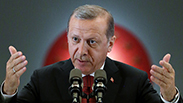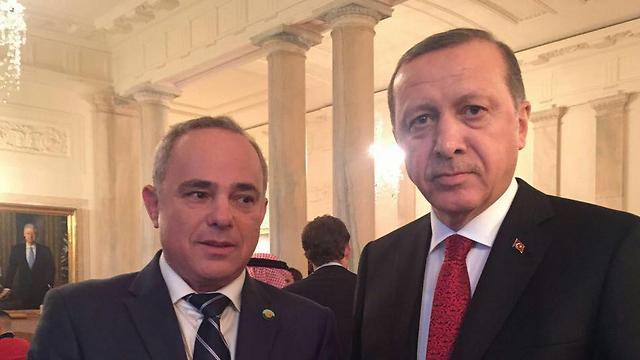
Turkey reconciliation: It’s not the gas, stupid
Op-ed: Israel’s true interests regarding its reconciliation with Turkey have little to do with any lucrative gas exportation deal, and more with finding a close partner in the fight against radicalism.
Turkey can be a valuable partner in commerce for Israel. The two countries’ markets complement each other: Turkey has vast amounts of natural resources, inexpensive labor and a prime location as the gateway between Europe and Asia. Israel has military, aerial and civilian technology, an exceptional trade agreement with the US and advanced software technology. Both sides have something to trade.
But despite what each would bring to the table, the reconciliation agreement between Israel and Turkey was not economically motivated, nor was it based on the energy issue: In the future, Israel may very well sell some of the gas produced from its Leviathan gas field to Turkey, but it also may not. The gas itself is still years from being extracted, and it remains unclear as to how it would be exported to Turkey. Tankards? A pipeline? A liquefying process? There are many options, all of whom are complicated and expensive.
And so, there is not much merit to the claim that future gas deals acted as an incentive for the Israeli government to sign the reconciliation agreement. Netanyahu naturally finds it convenient to wave futuristic (rather than future) contracts to get MKs to swallow their national pride and vote in favor of the agreement. In fact, people who are not economists, and especially politicians, tend to overstress economic considerations in regards to decisions of national importance. But just like with protests, when it comes to agreements, the economy is simply used as an excuse for a shift in policy, a convenient means to market the sudden change to a bewildered audience. 'We caved,' politicians tell their public to justify their fluctuating position. 'But you’re going to benefit from it.'
Such was the case in Iran, when the country’s leaders presented suspending its nuclear program as a completely reasonable price to pay for easing the economic sanctions placed on it. The tradeoff will indeed benefit Iran's economy, but even Tehran-based economists will tell you that its advantages will be limited, and perhaps even minor, as long as the current, corrupt regime remains in power. The only thing that could jumpstart Iran’s economy is a fundamental liberalization of all aspects of Iranian life, which is something that may never come about.
Israel’s gas reserves play a similar role in its reconciliation agreement with Turkey. A best-case scenario would have Israel selling its gas to Turkey within eight years, for about $1.2 billion a year. By then, Israel’s export is estimated to reach $120 billion—100 times that of the possible deal with Turkey.
Going beyond Israel’s Leviathan gas field, Minister of Energy Yuval Steinitz has expressed his support of the agreement and has stressed the potential that other large, new gas fields under the joint jurisdiction of Israel and Turkey hold for both countries. The potential of such reserves has yet to have been tested, but it is at least not an argument that offends people’s intelligence. However, using Leviathan as the crux of your argument is.
The State of Israel agreed to pay turkey over $20 million and offer a vaguely-worded apology because even the Israeli government understands that the IDF’s commandeering of the Mavi Marmara flotilla in May 2010 was a mistake. In hindsight, it’s clear that it would have been preferable to allow that ridiculous vessel to dock in Gaza and unload its insignificant cargo, including those supposed “peace” activists.
Israel’s legal right to uphold a naval blockade around Gaza has been recognized by a committee of legal minds set up by the UN; but it granted itself the right to act foolishly. Allowing the Marmara to pass through would not have broken the blockade or detracted from the IDF’s power of deterrence. Rather, it would have fortified it. But the Israeli government decided to give in to its baser instincts, and we all ended up paying for it.
Turkish President Recep Tayyip Erdoğan has also understood his own historical misstep: Israel, it turns out, isn’t his enemy; radical Islam is. Making peace with Israel and joining forces both overtly and covertly in the fight against radicalism is therefore clearly in Turkey’s best interest. I wouldn’t even be surprised if Erdoğan starts changing his internal affairs policy to reconcile with secular nationalists that have suffered from persecution, especially at the hands of the Turkish army and security services.
Israel can only gain from a positive relationship with Turkey, a neighboring, developing Muslim country with a population of 80 million people. There really is no need to justify the reconciliation agreement with any other claims.











